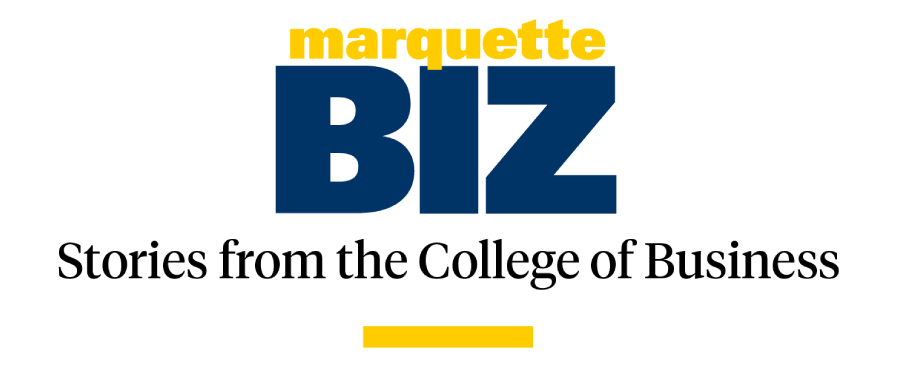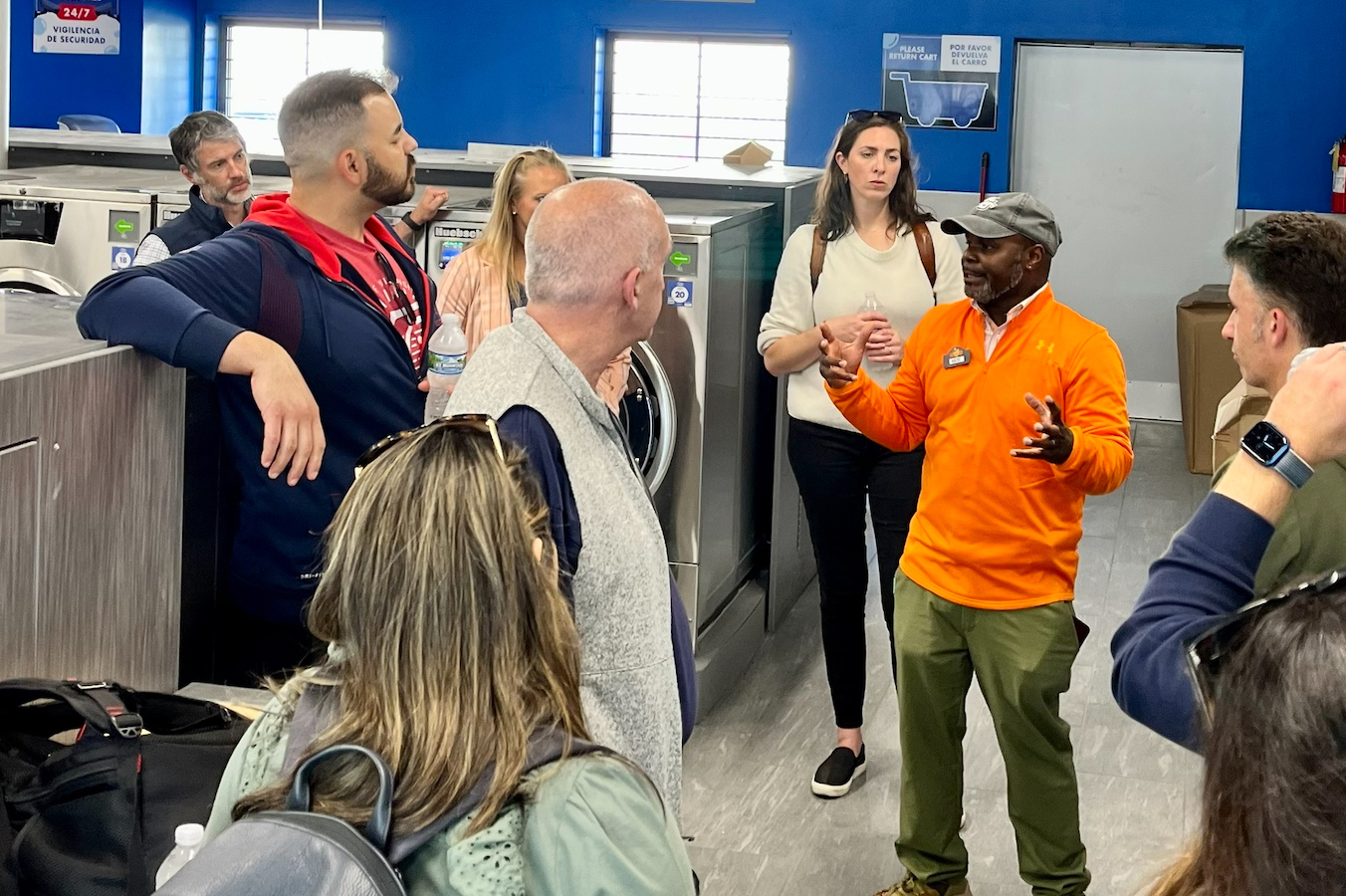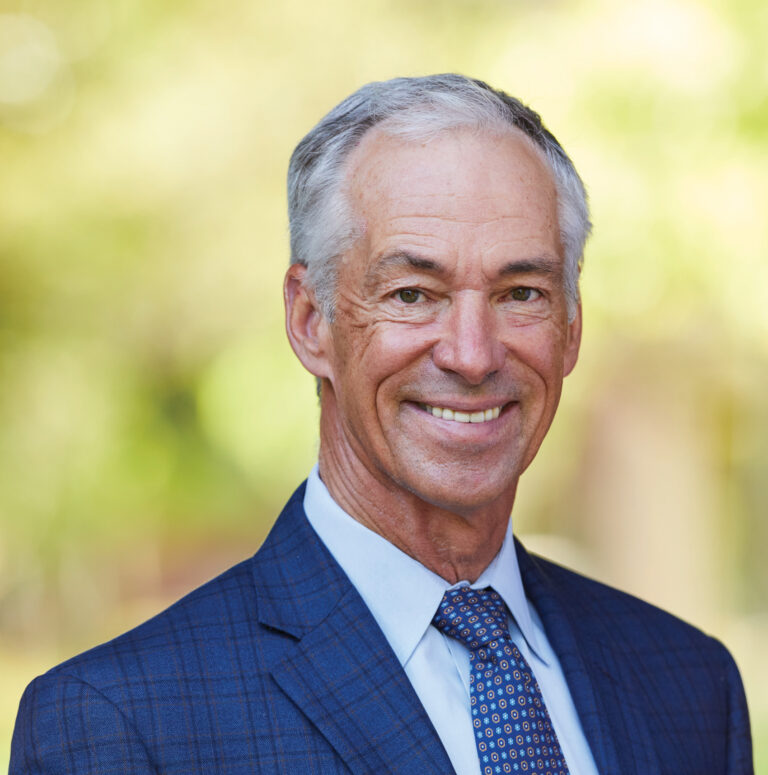When Dr. Melissa Shew wanted to give her students an up-close encounter with community-focused entrepreneurship, she made the city of Milwaukee her classroom.
“We do not exist in a vacuum; we exist already in a network of relationships in this city,” says Shew, faculty director of the Executive Master of Business Administration program. “Those relationships, in turn, require our moral and ethical obligations and we must pay attention to them.”
To emphasize this point, Shew’s EMBA group came to the 4300 block of West Fond du Lac Avenue to learn from Maurice “Moe” Wince, who owns a cluster of local businesses in Milwaukee’s Sherman Park neighborhood. The students, most of whom are mid-career professionals with upper management aspirations, spent the day touring Wince’s “business ecosystem,” which consists of a grocery store, a commercial kitchen, a community gathering space and a laundromat.
“Anybody in business, whether it be an entrepreneur or a student, should understand that you don’t just place a business in a community; your business should always become a part of the community in which it sits.”
Maurice Wince, Milwaukee entrepreneur
Such businesses might be commonplace elsewhere, but they were once a rarity in Sherman Park, a majority Black neighborhood on the city’s north side. As recently as five years ago, many Sherman Park residents lacked a nearby source of fresh produce and shopped for groceries at the gas station. There was no safe public space where local organizations could hold meetings. The only laundromat in the area was so dilapidated that one resident told Wince she “wouldn’t even wash her dog in there.”
Wince saw an opportunity to improve those conditions. He partnered with Marquette alumnus Walter Harvey, senior pastor at nearby Parklawn Assembly of God Church, to hold community listening sessions in which he asked Sherman Park residents what resources they lacked. Once they told him, he started building them.
“Anybody in business, whether it be an entrepreneur or a student, should understand that you don’t just place a business in a community; your business should always become a part of the community in which it sits,” Wince says.
Wince’s vision of making commerce a pillar of his neighborhood aligns with Shew’s lessons on stakeholder theory, which asserts that a business has four equally important constituencies: employees, customers, shareholders and the community. This differs from the decades-long sentiment in corporate America and business academia that companies were obligated to put profits above all other concerns.
Marquette’s location in the heart of Milwaukee puts its students within easy access of small business owners who put classroom theory into tangible action. The College of Business Administration prides itself on connecting what’s good for business with what’s good for people, and Shew saw an opportunity to illustrate that point to her class in a powerful way.
“I wanted to share with students an exemplary community change agent who is running for-profit businesses with a purpose,” Shew says. “That’s Moe’s true nature and guiding lesson to us all. It is the responsibility of corporations and institutions, no matter where they are or what kind, to do more than appease shareholders.”
“Speaking with Moe emphasized the importance of entrepreneurship for more than simply money, but also for the benefit and health of the community. That will bring not just profits, but longevity too,” says EMBA Class of 2023 graduate Taha El-Shahat.
To show students how it works, Wince gathered them at Upstart Kitchen, a spacious commercial cooking and baking facility next to his grocery store. The kitchen, a collaborative effort among Wince, Harvey and the nonprofit Prism Economic Development Corporation, started after Wince noticed how many Sherman Park residents sold food out of their houses to earn extra income.
Initially, none of these would-be entrepreneurs had reliable access to resources that would allow them to scale their side jobs into a business. Since Upstart Kitchen opened in 2020, that has changed dramatically; more than two dozen entrepreneurs currently use the space and some of them have already opened brick-and-mortar locations.
EMBA student Marilka Velez was inspired by the experience.
“The lessons I learned on this trip that apply to our professional lives going forward are to remain curious and to continue challenging yourself to seek out new experiences,” Velez says. “Leadership in the business community is key to continuing innovation, sparking new ideas and supporting entrepreneurship.”
Students in the roughly dozen-strong EMBA cohort take part in a 17-month hybrid program, meeting every other Saturday on Marquette’s campus and completing supplementary work offsite. The program requires students to have at least five years in a management role; the average participant has 16 years of overall work experience. Both U.S. News & World Report and Poets & Quants rank Marquette’s EMBA program among the top 30 nationwide.
Experiential learning has a lot to do with Marquette’s strong rankings. Students visited Wince for reasons beyond mere curiosity; they were also gathering ideas for their final group projects, which involved applying their business acumen to solve pressing problems in today’s world.
Some program alumni used their group projects to work directly with Wince when he was just starting the Sherman Park Grocery Store. Jim Wong graduated with his EMBA in December 2022 and is president of Juiced!, a cold-pressed juice company based on Milwaukee’s south side. Wong’s team, named “Green Titans Go,” donated an urban farming pod to the grocery store, which allows community members to grow fresh produce hydroponically. When the EMBA students visited 10 months later, every space in the pod was occupied with kale, lettuce, and collard and mustard greens.
“(Dr. Shew’s) class made a big impact on me,” Wong says. “It was terrific to get out and tackle a real problem. It’s one thing to learn about food deserts in the classroom, but it was another to get to talk to Moe and Feeding America and confront this problem. That was a great learning opportunity.”
Adds Shew: “The hope is that all our students can learn from people like Moe how to inspire change in their own businesses.”
If you’re interested in learning more about Graduate School of Management programs, please use this form to request information.




